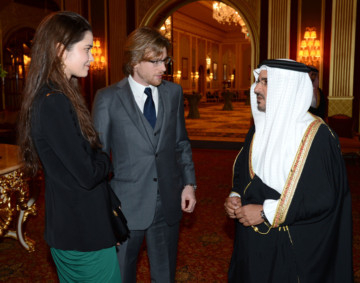
Manama: Bahrain’s Crown Prince Salman Bin Hamad Al Khalifa said that he would attend the ongoing national talks at the right time and place.
“If I attend talks and they fail as they did in 2011, the costs are extremely high,” he told the media as he toured the Bahrain International Circuit on the eve of the Bahrain Grand Prix.
“I cannot speak for different political groups or different political views that are present at the table. So there is a time and a place for me to step in. It is not yet there.”
The talks were launched on February 10 to help break a political deadlock that has gripped the island nation for two years following sharp divergences over the events that unfolded in February and March 2011. Delegates from Al Fateh coalition, the opposition coalition, the parliament and the government have attended 13 rounds over 10 weeks, but deep disagreements have hampered them from agreeing on the platform, agenda and outcome of the talks.
The opposition has been pushing for a representative of King Hamad Bin Eisa Al Khalifa, preferably Prince Salman, to join the talks to give them a greater impetus. However, the Royal Court said that the king stood equidistant from all interlocutors and that no representative would attend the talks.
Another contention point has been whether a referendum should be organised at the end of the talks to endorse the results. The opposition has been pressing for the option, explaining that it would allow Bahrainis to have a say in the results, whereas Al Fateh coalition has insisted on referring the outcome to the parliament. Both coalitions have been accusing each other of stalling the dialogue.
“The talks on Sunday will focus on continuing the debate over the outcome of the dialogue in order to reach a consensus between all components on the issue,” Eisa Abdul Rahman, the spokesperson for the dialogue, said. “Once this point is settled, the dialogue will move on to discuss the issue of fair representation,” he said.
The opposition has accused the three other groups at the talks of working together against it and that its eight delegates were facing the eight representatives from Al Fateh coalition, the eight independent parliamentarians and the three ministers. “We want, for the sake of fair representation at the table, to replace the eight parliamentarians or to have four independent figures selected by us and the other four by Al Fateh,” the opposition said.
The slow pace of the national dialogue has frustrated several Bahrainis, particularly those who have been highly sceptical about them. “I wish they were going faster,” Crown Prince Salman told the media. “But I’m hopeful. They are happening. That is the important thing. All sides get a chance to air their grievances and that is very key.”
The Crown Prince was quoted as saying that Bahrain would not “isolate” itself from progress and reforms and that talks would continue. “Sitting in a bunker and isolating ourselves is not going to help. We are talking and we will continue to talk. This is because we feel that is the only way we can solve issues,” he said.
“We are an emerging democracy and we will have differences. We will, however, solve those differences and move ahead.”












